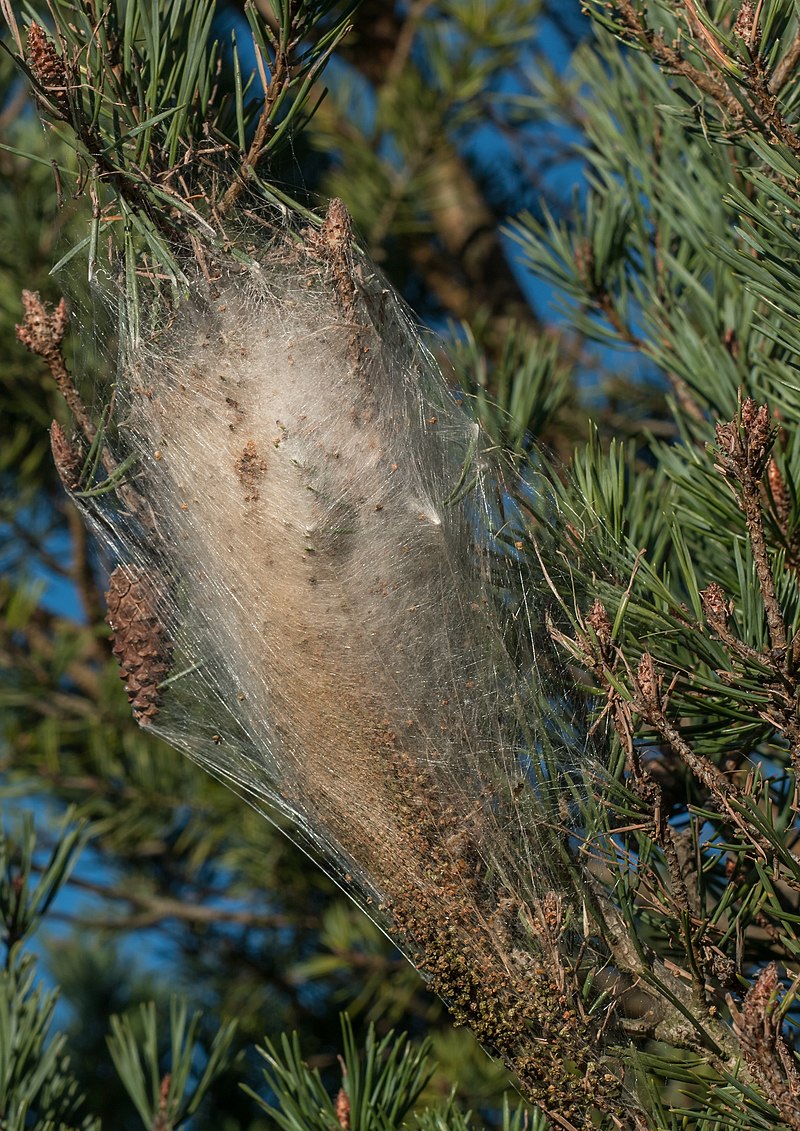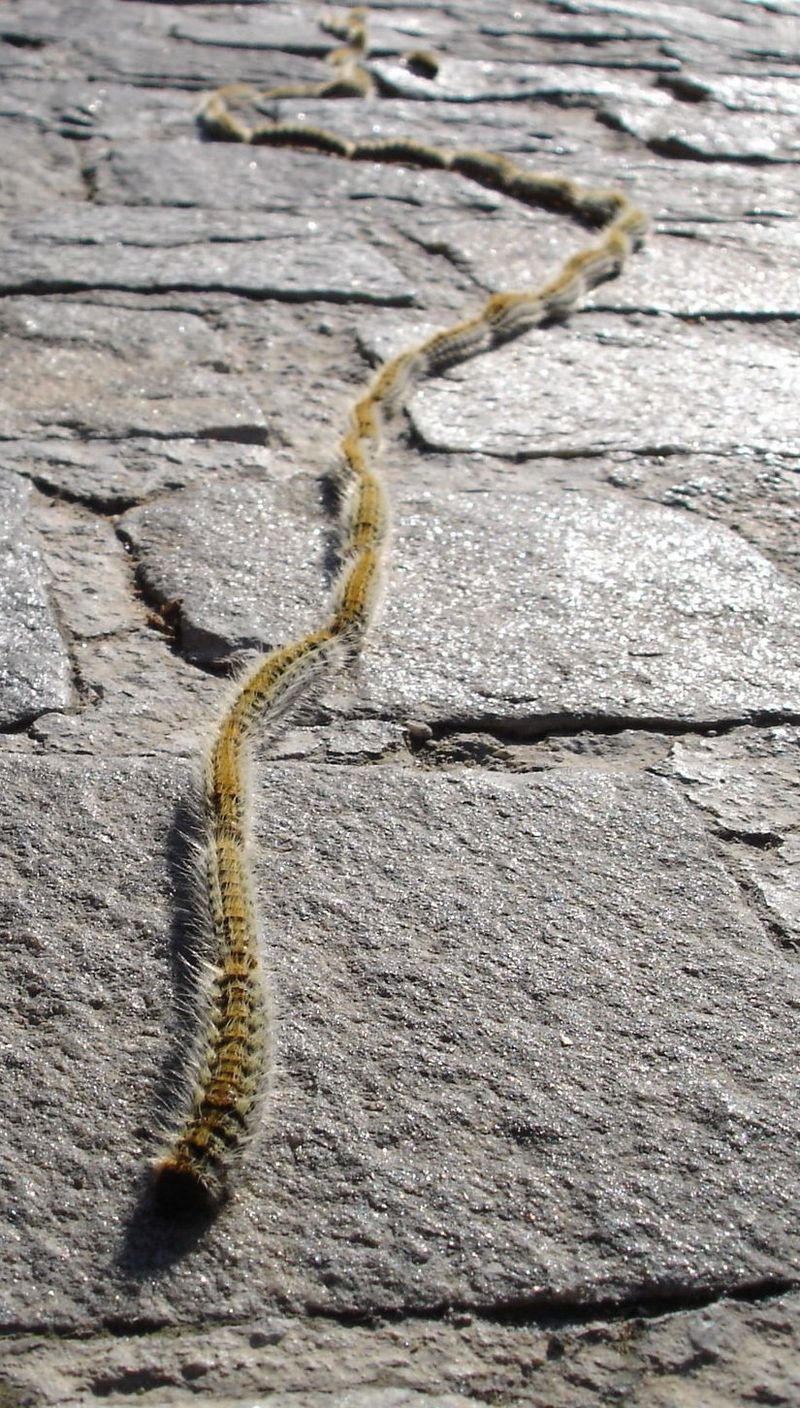Cyprus Mail 23 March 2025 - by Rebekah Gregoriades
Forestry Department curbs the spraying of pine trees
The story goes like this: moths laying eggs in hanging weblike nests that drop to the ground when they have served their purpose, larva hatching out and eating pines trees to death and toxic caterpillars descending to burrow underground to reappear as moths in time to repeat the process, leaving stripped branches and a long string of allergic reactions in their wake.
This is not a dark fantasy script but a very real cycle that afflicts pine trees across the island and can cause skin irritation of varying severity to humans and animals.
For years, the Forestry Department was spraying pine trees by plane with harmful chemicals, however recently it has restricted spraying to certain forest areas and is now using biological preparations.
Pine processionary pitiocampus known in Cyprus as kambies – not to be confused with ground processionary ocnogyna Cypriaca or martouthkia – has been the subject of much discussion, including at the House environment committee.
The authorities are “aware of the big problem but it is so widespread that they only spray specific forest areas”, chairman of the committee, Green Party MP Charalambos Theopemptou told the Cyprus Mail. He pointed out that a pine tree could die due to extensive defoliation by the caterpillars, to the point that it could not rejuvenate the next year.
The life cycle of pitiocampus is egg, larva (caterpillar), nymph (chrysalis) and adult (moth). Although pitiocampus can help renew pine foliage, enrich the soil and serve as nutrition for other species, large populations can cause trees to die, which in turn increases the risk of fire, and cause allergies, leading to dermatological and respiratory problems in people and animals.
The Forestry Department said it was actively engaged in the issue, as “90 per cent of the forests of the island are pine forests”.

“For years now, the pitiocampus insect is the only organism harmful to Cyprus’ forests and is systematically combatted by the Forestry Department,” they said.
Villages faced with a large population of pitiocampus have contacted the Forestry Department after thorough aerial spraying stopped and reported to have been told to spray the trees themselves.
“This year, the insect infestation due to unfavourable weather conditions […] was limited and large pine-covered areas in the mountains and on the plains have been affected to a lesser extent,” the department told the Cyprus Mail.
“Pitiocampus temporarily hinders the growth of pine trees because it totally or partially eats the needles. Rarely does one see the necrosis of mainly some stunted pine trees, especially in areas of young reforestation in low altitudes, where they grow in arid and dry soil.”
The department added that during spring and later on new pine needles grow and the trees gradually regain their foliage, with the only loss being their temporary unsightly appearance and impeded growth.
The Forestry Department follows international practices and drafts a programme annually to monitor and control the population of the insect. This includes installing a network of pheromonic traps and planning aerial and ground spraying.
Pine trees in the Natura 2000 network are not sprayed, in line with the new EU regulation currently in the pipeline.
Special attention is given to areas that receive high visitor traffic and residential areas.
The department said many Mediterranean countries are following practices to protect people from the allergies caused by the larva.

Other measures are being taken to restrict the spread of pitiocampus: increasing its natural predators, such as other insects, birds and bats, increasing pheromonic traps, use of mechanical control in appropriate cases, such as in school yards and homes, and not planting pinus brutia in schools, parks etc.
“It is very important to mention that the main mission of the Forestry Department is the preservation and protection of forests from any threat,” it said.
Theopemptou said that when the committee “discussed the issue over a year ago, the Forestry Department had told us that the caterpillars could be dealt with in two ways: one was to spray them, which is very costly as it includes the airplane, and the other is to wrap the tree trunk to prevent the caterpillars from reproducing.”
The authorities are “aware of the big problem but it is so widespread that they only spray specific forest areas”, he said.
Theopemptou clarified that it was not just a matter of cost, but also of the chemicals damaging nature.
He also said pine trees could die due to extensive defoliation by caterpillars, to the point that it could not rejuvenate the next year.
Gourri community leader Kyriakos Rozos told the Sunday Mail that the pine trees in the forests are sprayed, but not those around residential areas causing a serious problem.
“The pine trees near the community are full of caterpillars and we are worried that the trees will die. The caterpillars are also very harmful to health. Last year we nearly lost a lady who touched them,” he said.
Rozos said he contacted the Forestry Department, which said they could not spray near residential areas.” The alternative Rozos was given was “spray them yourselves”. However, this is a costly business.
Rozos said he sprayed a couple of areas in the village last year and it cost him over €400 for the insecticide and the tractor.
“To spray the whole community, I would need €2,000. A poor community such as ours, with just 250 inhabitants, can’t afford it,” he said.
Rozos predicted that the local administration reform would make things harder for the community in financial terms. “Small communities will disappear. The MPs didn’t even know what they were voting for,” he added.
Mathiatis community leader Theodoros Kyriakou told the Cyprus Mail that he sprayed his community’s trees and any affected were “rejuvenated in the spring”. Those that did die were due to “prolonged drought”, he explained.
Mathiatis purchased the insecticide and in collaboration with the Forestry Department sprayed the pine trees within the village limits by hand, because once the caterpillars descend the allergies start.
